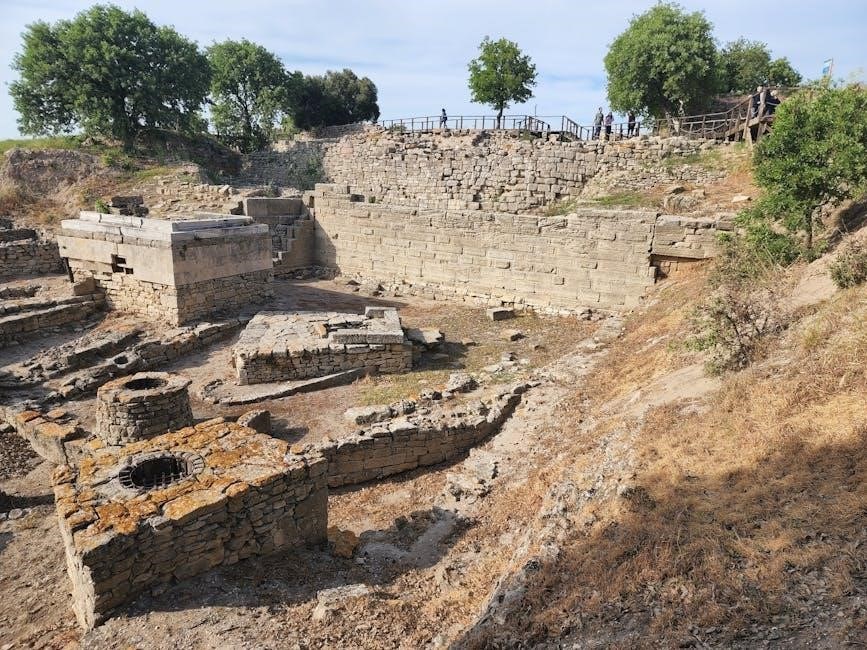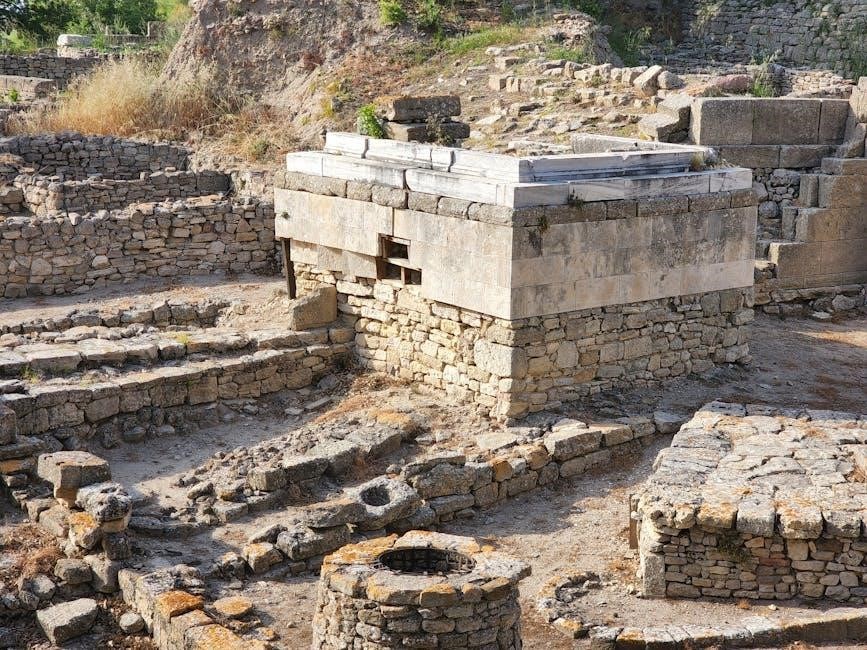The Iliad, an ancient Greek epic poem attributed to Homer, explores the Trojan War and Achilles’ wrath. Richmond Lattimore’s translation is renowned for its fidelity, offering a seminal work in Western literature accessible in PDF formats.
Overview of the Iliad
The Iliad, an epic poem attributed to Homer, is set during the Trojan War, a ten-year conflict between Greek city-states and Troy. It focuses on the final weeks of the war, exploring the wrath of Achilles, a Greek hero, after a dispute with Agamemnon, the Greek commander. This conflict escalates into a tragic chain of events, highlighting themes of honor, pride, and mortality. The poem is divided into 24 books, written in dactylic hexameter, and contains approximately 15,693 lines, making it one of the most significant works in Western literature. Richmond Lattimore’s translation is celebrated for its fidelity to the original text, capturing the poetic essence while maintaining readability. The Iliad’s exploration of human emotions and warfare continues to resonate, solidifying its place as a cornerstone of classical literature.
Historical Context of the Iliad
The Iliad is set against the backdrop of the Trojan War, a legendary conflict in Greek mythology. Historically, the poem is believed to have been composed around the mid-8th century BCE, though its events are fictionalized. The story revolves around the abduction of Helen by Paris, a prince of Troy, leading to a decade-long siege by a coalition of Greek states. The Iliad focuses on the final weeks of this conflict, emphasizing the human and divine elements that shaped its outcome. Richmond Lattimore’s translation captures the historical and cultural nuances of the original text, providing insights into ancient Greek values and warfare. The poem’s historical context is enriched by its exploration of heroism, honor, and the complexities of human nature, making it a vital source for understanding ancient Greek society and literature.

Richmond Lattimore’s Translation
Richmond Lattimore’s translation of the Iliad is celebrated for its faithful rendering of Homer’s original Greek text. Published by the University of Chicago Press, it captures the epic’s grandeur and complexity, balancing poetic grace with scholarly accuracy.
Background of Richmond Lattimore
Richmond Lattimore was a distinguished American poet and translator, best known for his acclaimed English translations of classical works. Born in 1906 and educated at Dartmouth College and the University of Illinois, Lattimore developed a deep appreciation for ancient Greek literature. His translation of Homer’s Iliad, published in 1951, is celebrated for its fidelity to the original Greek text while maintaining poetic elegance. Lattimore’s work earned him widespread recognition, solidifying his reputation as a master translator. He also translated other classical texts, including the Odyssey and works by Aristophanes. Lattimore’s contributions to classical scholarship and literature remain unparalleled, making his translations essential for both scholars and general readers. His meticulous approach and poetic sensibility ensure that the timeless themes of the Iliad resonate powerfully in modern English.
Key Features of Lattimore’s Translation
Richmond Lattimore’s translation of the Iliad is celebrated for its fidelity to Homer’s original Greek text. Lattimore meticulously preserved the poetic meter and dactylic hexameter, ensuring the epic’s rhythmic grandeur. His translation is notable for its literal accuracy, capturing the complexity and nuance of Homer’s language. Lattimore retained Greek names and terms, such as “Achilleus” instead of “Achilles,” to maintain authenticity. The translation strikes a balance between scholarly precision and poetic elegance, making it accessible to both academics and general readers. Lattimore’s work includes a comprehensive introduction by Richard Martin, offering historical and literary context. The PDF version of his translation is widely available, featuring clear typography and readability, enhancing its appeal for digital audiences. Lattimore’s approach ensures that the Iliad’s themes and emotional depth resonate vividly in modern English, preserving its timeless appeal.
Reception of Lattimore’s Translation
Richmond Lattimore’s translation of the Iliad has received widespread acclaim for its faithfulness to Homer’s original text. Scholars and readers alike praise its meticulous attention to detail and poetic rendering, which captures the epic’s grandeur. The translation is often commended for its ability to balance literal accuracy with readability, making it a preferred choice for both academic and general audiences. Lattimore’s work has been influential in shaping modern perceptions of Homer’s masterpiece. The availability of his translation in PDF format has further enhanced its accessibility, allowing a broader audience to engage with the Iliad. This widespread availability has contributed to its enduring popularity and critical acclaim, solidifying its place as a seminal work in Western literature.


The Iliad in Digital Formats
The Iliad is widely available in digital formats, including PDF, ensuring accessibility across various devices. Richmond Lattimore’s translation is particularly popular in PDF, offering a convenient reading experience for modern audiences.
Availability of the Iliad in PDF
The Iliad in PDF format is readily accessible online, with Richmond Lattimore’s translation being a popular choice. This version, published by the University of Chicago Press, offers a faithful rendering of Homer’s epic poem.

Users can download the PDF from various platforms, including academic databases and online bookstores like Amazon. The digital format ensures compatibility with multiple devices, making it convenient for readers to access the text anytime and anywhere.
The PDF version includes an introduction by Lattimore, providing valuable context and insights into the poem’s historical and cultural significance. This makes it an excellent resource for both casual readers and scholars alike.
Downloading the Lattimore Iliad PDF
Downloading the Lattimore Iliad PDF is a straightforward process, with multiple platforms offering this version of Homer’s epic poem. The University of Chicago Press, along with online retailers like Amazon, provides digital copies of Lattimore’s translation.
The PDF is widely available, ensuring accessibility for scholars and casual readers alike. It features Richmond Lattimore’s precise translation, maintaining the poetic essence of the original text while offering a modern, readable format.
Users can also find the Lattimore Iliad PDF on academic databases and websites like Z-Library, often free of charge. The digital version includes an introduction by Lattimore, enhancing the reader’s understanding of the poem’s historical and cultural context.
With an ISBN of 978-1-737-04893-0 for the digital edition, the PDF is compatible with various devices, making it easy to study or enjoy on e-readers, tablets, or smartphones.
Compatibility Across Devices
The Lattimore Iliad PDF is designed to be compatible with a wide range of devices, ensuring accessibility for readers across different platforms. Whether on a desktop computer, tablet, e-reader, or smartphone, the PDF format maintains its clarity and readability.
Readers can easily adjust font sizes and zoom in for comfort, making the text adaptable to various screen sizes. The digital version is also available in formats like ePub and MOBI, further enhancing compatibility with popular e-reading devices such as Amazon Kindle and Kobo eReaders.
Platforms like Z-Library and online bookstores offer downloadable versions, allowing users to access the Iliad on multiple devices seamlessly. This versatility ensures that Richmond Lattimore’s translation remains accessible and convenient for modern readers.

The PDF’s compatibility across devices makes it ideal for both academic study and casual reading, providing a consistent and engaging experience regardless of the platform used.

Structure and Content of the Iliad

The Iliad, divided into 24 books, recounts key events of the Trojan War, focusing on Achilles’ wrath and its far-reaching consequences, shaping the epic narrative of ancient Greek literature.
Division into 24 Books
The Iliad is structured into 24 books, each focusing on specific events or themes within the Trojan War. This division allows for a detailed exploration of the narrative, character development, and poetic style. The PDF versions of Richmond Lattimore’s translation maintain this structure, ensuring that readers can engage with the epic in its traditional form. Each book serves as a chapter, guiding readers through the progression of the conflict and the emotional journey of characters like Achilles and Hector. The division into 24 books also reflects the oral tradition from which the Iliad originated, with each section designed to be recited or performed. Lattimore’s translation preserves this historical and literary significance, making the PDF editions a valuable resource for both scholars and general readers interested in the epic poem’s composition and cultural impact.
Themes and Key Events
The Iliad explores timeless themes such as honor, pride, and the human cost of war. Central to the narrative is the wrath of Achilles, sparked by his conflict with Agamemnon over the captured princess Briseis. This dispute escalates tensions within the Greek camp, leading to significant consequences. Key events include the duel between Paris and Menelaus, the devastating rage of Achilles after the death of his friend Patroclus, and the poignant meeting between Priam and Achilles. Richmond Lattimore’s PDF translation captures the emotional depth and complexity of these themes, making the epic accessible to modern readers. The Iliad’s exploration of heroism, mortality, and the futility of conflict remains a cornerstone of Western literature, resonating deeply in Lattimore’s rendition. These themes and events are meticulously preserved in the PDF format, ensuring that the essence of Homer’s masterpiece endures for future generations;
Significance of the Trojan War
The Trojan War, central to the Iliad, holds immense historical and cultural significance as a defining event in Greek mythology. It symbolizes the clash of civilizations and the pursuit of honor, themes vividly captured in Richmond Lattimore’s PDF translation. The war, sparked by the abduction of Helen, represents a struggle for power and prestige, reflecting broader human conflicts. Lattimore’s translation highlights the war’s impact on individuals and societies, offering insights into heroism, sacrifice, and the futility of conflict. The Trojan War’s legacy endures in literature and art, with Lattimore’s rendition ensuring its relevance for modern readers. His PDF version preserves the epic’s emotional depth, making the Trojan War’s significance accessible to a global audience, thereby cementing its place in the cultural consciousness.

Study Resources and Guides
Various study resources, including PDF commentaries and guides, are available for Richmond Lattimore’s translation of the Iliad. These tools offer in-depth analyses, historical context, and interpretative insights, aiding scholars and students alike.
Commentaries on the Lattimore Translation
Commentaries on Richmond Lattimore’s translation of the Iliad provide in-depth analyses of Homer’s epic poem. These resources, often available as free PDF downloads, explore themes, character development, and historical context. Scholars like H.G. Evelyn-White and Richard Martin offer insights into Lattimore’s linguistic choices, ensuring fidelity to the original Greek text. The commentaries highlight the poem’s structure, such as its division into 24 books, and delve into the significance of key events like the wrath of Achilles. They also examine the cultural and historical backdrop of the Trojan War, making the Iliad more accessible to modern readers. These PDF commentaries are invaluable for both academic study and personal enrichment, offering a deeper understanding of Lattimore’s translation and its relevance in contemporary literature.
Study Guides for the Iliad
Study guides for the Iliad are essential resources for understanding Homer’s epic poem, particularly when paired with Richmond Lattimore’s translation. These guides provide detailed summaries, character analyses, and thematic explorations, helping readers navigate the complexities of the text. Many guides are available as free PDF downloads, offering convenient access to scholarly insights. They often include historical context about the Trojan War, explanations of poetic devices, and interpretations of key events, such as Achilles’ wrath and the siege of Troy. Some guides also focus on Lattimore’s translation, highlighting his faithful rendering of Homer’s dactylic hexameter and the nuances of his language. Whether for academic study or personal enrichment, these guides enrich the reading experience of the Iliad, making its ancient themes and characters more accessible to modern audiences; They are widely available online, often alongside the Lattimore translation in PDF format.
Online Platforms for Learning
Various online platforms offer resources for studying the Iliad, making it accessible to learners worldwide. Websites like Z-Library and PDF Room provide free access to Richmond Lattimore’s translation in PDF format, enabling easy downloading and reading. Platforms such as Coursera and edX feature courses that incorporate the Iliad, often using Lattimore’s version for their syllabi. These courses include video lectures, discussion forums, and quizzes, fostering a deeper understanding of the epic poem. Additionally, educational websites like SparkNotes and LitCharts offer study guides, summaries, and analyses tailored to Lattimore’s translation, helping students grasp complex themes and characters. Online forums and communities dedicated to classical literature also discuss the Iliad, sharing insights and interpretations. These platforms collectively create a rich, interactive environment for engaging with Homer’s masterpiece in the digital age, supported by Lattimore’s esteemed translation.

Cultural and Academic Impact
The Iliad’s influence spans millennia, shaping Western literature and thought. Richmond Lattimore’s translation remains a cornerstone in academic studies, enriching scholarly discourse and inspiring modern reinterpretations across various media.
Influence on Western Literature
The Iliad, through its exploration of human conflict and heroism, has profoundly shaped Western literature. Richmond Lattimore’s translation captures the epic’s original diction, preserving its emotional depth and poetic grandeur. This rendition has inspired countless authors, poets, and scholars, embedding the Iliad’s themes into the fabric of modern storytelling. Its influence is evident in works that explore themes of honor, revenge, and mortality, reflecting the timelessness of Homer’s narrative. As a foundational text, the Iliad continues to resonate, with Lattimore’s translation bridging ancient and contemporary readers, ensuring its enduring impact on literary traditions and academic discourse alike. The PDF availability of this translation has further amplified its reach, making it accessible to a global audience. Thus, the Iliad remains a pivotal work in the canon of Western literature.
Academic Analysis and Interpretations
Richmond Lattimore’s translation of the Iliad has been a cornerstone for academic analysis, praised for its fidelity to Homer’s original Greek text. Scholars appreciate its precise rendering of diction and meter, making it a valuable resource for classical studies. The translation’s faithfulness to the source material has enabled deep textual analysis, particularly in examining themes like honor, revenge, and human vulnerability. Academic commentaries often highlight Lattimore’s ability to preserve the epic’s poetic essence while maintaining clarity. His work has also facilitated interdisciplinary studies, connecting literature with history and philosophy. The availability of the Lattimore Iliad in PDF has further enhanced its accessibility for scholars, ensuring its continued relevance in academic discourse and interpretation. This translation remains indispensable for both researchers and students seeking to explore the complexities of Homer’s masterpiece.
Modern Relevance of the Iliad
The Iliad remains a cornerstone of Western literature, offering timeless insights into human nature, conflict, and emotion. Its exploration of themes such as honor, pride, and mortality continues to resonate with modern audiences. Richmond Lattimore’s translation, widely available in PDF, ensures accessibility for contemporary readers. The epic’s structure, divided into 24 books, and its poetic style in dactylic hexameter, highlight its artistic and historical significance. The Trojan War’s narrative, centered on the abduction of Helen and the siege of Troy, underscores the enduring impact of political and personal disputes. Digital formats like the Lattimore Iliad PDF have made this ancient masterpiece reachable to a global audience, fostering its study and appreciation. The Iliad’s influence extends beyond literature, inspiring art, film, and philosophy, proving its relevance in understanding both historical and contemporary human experiences. Its themes of heroism and tragedy remain universally relatable, ensuring its enduring legacy in modern times.
The Iliad, through Richmond Lattimore’s acclaimed translation, remains a vital work in literature. Its availability in PDF formats ensures accessibility for modern readers. For deeper exploration, readers can refer to commentaries, study guides, and online platforms offering insights into Homer’s masterpiece.
Final Thoughts on the Iliad
The Iliad, as translated by Richmond Lattimore, remains a cornerstone of Western literature, offering profound insights into human nature, heroism, and the complexities of war. Its digital availability in PDF formats ensures that this ancient epic continues to reach modern audiences, preserving its timeless relevance. Lattimore’s translation is celebrated for its fidelity to Homer’s original intent, making it a valuable resource for scholars and casual readers alike. The Iliad’s exploration of themes such as honor, pride, and mortality resonates as deeply today as it did in antiquity. For those seeking to delve deeper, the PDF version of Lattimore’s translation provides a convenient and accessible way to engage with this masterpiece. Ultimately, the Iliad endures as a testament to the power of storytelling and its ability to transcend time and culture.
Recommended Reading for Further Study
For a deeper understanding of the Iliad, explore scholarly commentaries and study guides that complement Richmond Lattimore’s translation. Resources like “A Commentary on Homer’s Iliad” provide insights into the historical and literary context of the epic poem. Additionally, online platforms offer detailed study guides that analyze themes, characters, and key events. The Lattimore translation is widely available in PDF format, making it accessible for digital readers. Platforms such as Amazon, Google Books, and academic databases offer downloadable versions of the Iliad, along with supplementary materials. For those interested in further exploration, the University of Chicago Press provides companion books and essays that enrich the reading experience. These resources ensure that readers can engage with the Iliad in a comprehensive and meaningful way, whether in print or digital formats.

Leave a Reply